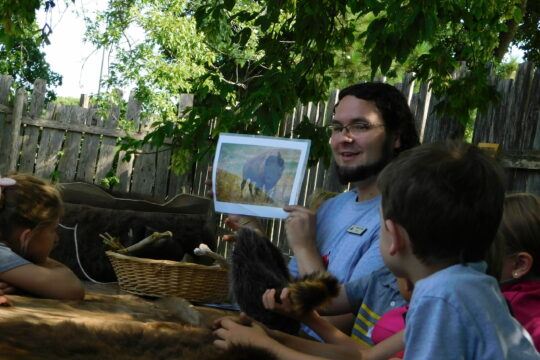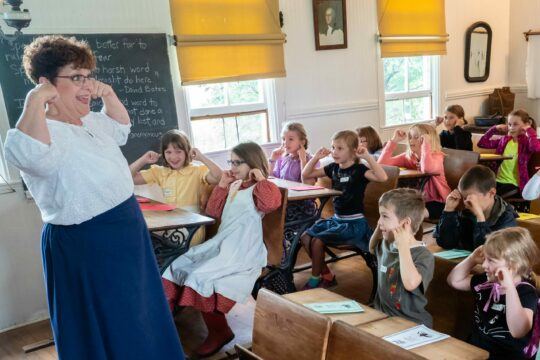Dakota Field Trip

Learn about the Dakota of Cloud Man's Village
This tour, offered May through October, focuses on the life ways of the Dakota, Minnesota’s first people, in the early nineteenth century. It includes an introduction to Cloud Man and his village, the travois and gardens, maple sugar camp, summer bark lodge, wild rice camp, tipi, and a beaded bracelet hands-on activity. Some Dakota language is incorporated as well. This tour is recommended for first grade and up. Details on adding a Pioneer tour to this field trip experience is outlined below. All Gibbs Farm staff have passed a State of Minnesota background check.
A note on our Dakota Field Trip curriculum: This historical curriculum was created with significant input from descendants of Maȟpiya Wičhášta (Cloud Man) as well as other Dakota culture bearers and it is with utmost appreciation that Gibbs Farm staff are able to share this important history. Gibbs Farm management is dedicated to consistently reviewing and revising, if necessary, this curriculum with advice and guidance from Dakota partners and Dakota partner organizations. We pledge to use this history in our educational programs to help all our communities to be more informed, more engaged, and more aware of the impact of Dakota culture in history, in the present, and in the future. Read our Land Acknowledgment.
Winter Field Trips: We now offer a version of the Dakota field trip during the winter (November-March) for groups of up to 50 students! Explore the tipi, learn about the 13 Dakota moons, and make a winter count craft. See pricing information below. This tour is recommended for first grade and up. A Pioneer Tour option is also available, see the Pioneer Field Trip page for details.
Pricing and Timing
Regular Season (May-October): Allow two hours. Price: $8/student. School staff are free of charge as well as two parent chaperones per classroom. Additional parent chaperones pay $8. Schools are invoiced after the field trip.
Winter Season (November-March): Allow 90 minutes. Price: $8/student. School staff are free of charge as well as two parent chaperones per classroom. Additional parent chaperones pay $8. Schools are invoiced after the field trip.
Homeschool Group Chaperones: All adults pay $8.
Free & Reduced Lunch Rate: Schools that have 50% or more students eligible for free and reduced lunch, rate is $2 less ($6 for 2-hour tour, $10 for 4-hour).
How to Book
Fill out our field trip interest form or reach out directly to our Site Manager, Sammy Nelson. Please note that field trips are not confirmed through the field trip interest form.

Add a Pioneer Tour to your Visit
Schools and groups may opt for both a Pioneer and Dakota tour on the same day (May-October). This includes the Dakota and Pioneer tours as described, one hands-on activity (candle dipping or beaded bracelets), and a ½ hour lunch break (bring bag lunches). Allow four hours. Price: $12.00/student. (See above for teacher and chaperone pricing). These tours are recommended for first grade and up.
About the Academic Standards
The Gibbs Farm Dakota Field Trip meets the following Minnesota State Education Standards.
Grade 1 Standards Met
1.1.3.2.1. The Nature of Science and Engineering: Recognize that tools are used by people, including scientists and engineers, to gather information and solve problems.
1.3.1.3.3 Earth and Space Science: Identify and describe large and small objects made of Earth materials.
1.4.1.2.2 History: Describe how people lived at a particular time in the past based on information found in historical records and artifacts.
1.4.2.4.1 History: Compare and contrast family life from earlier times and today.
1.4.2.4.2 History: Compare and contrast buildings and other technologies from earlier times and today.
Grade 2 Standards Met
2.1.2.2.2 The Nature of Science and Engineering: Identify a need or problem and construct an object that helps to meet the need or solve the problem.
2.1.2.2.3 The Nature of Science and Engineering: Explain how engineered or designed items from everyday life benefit people.
2.4.1.2.1 History: Use historical records and artifacts to describe how people’s lives have changed over time.
2.4.2.4.1 History: Compare and contrast daily life for Minnesota Dakota peoples in different times, including before European contact and today.
2.4.2.4.2 History: Describe how the culture of a community reflects the history, daily lives, or beliefs of its people.
Grade 3 Standards Met
3.1.3.2.1 The Nature of Science and Engineering: Men and women throughout history of all cultures, including Minnesota’s American Indian tribes and communities, have been involved in engineering and scientific inquiry.
3.3.1.1.1 Geography: Use maps and concepts of locations (relative location words and cardinal and intermediate directions) to describe places in one’s community, the state of Minnesota, the United States, or the world.
3.4.1.1.1 History: Reference different time periods using correct terminology, including the terms decade, century, and millennium.
3.4.1.2.1 History: Examine historical records, maps, and artifacts to answer basic questions about times and events in history, both ancient and more recent.
Virtual Field Trip Options Available
Can’t attend a field trip in-person? We offer virtual field trip experiences too!